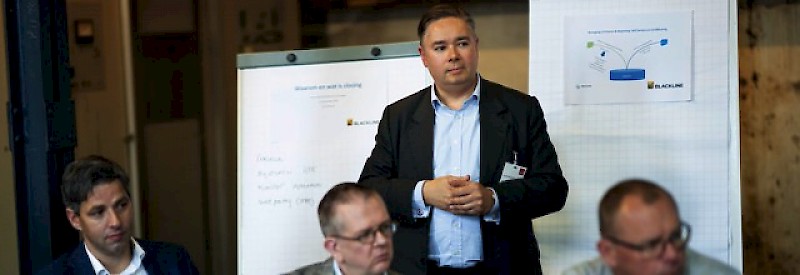Article FM.nl on December 3 (https://financieel-management.nl/artikel/is-de-maandelijkse-afsluiting-noodzakelijk)
"Without people, most closures run aground." BlackLine at the Leadership in Finance Summit 2019.
A hesitant start to this round table at the Leadership in Finance Summit 2019, with a room full of CFOs and finance directors initially batting their heads. Yet speakers Raymond Steenvoorde - Account Director at BlackLine, sponsor of this round table - and Louis de Koning - partner at Improven and lecturer at Nyenrode University - coaxed the attendees into making statements. When asked by the finance professionals seated at the table about the need for monthly closing, some 65 per cent answered in the affirmative.
Which also immediately revealed the difference between the old and new way of closing. Representatives of a supermarket chain revealed that they make a daily closure of stock and cash flows. This provides 24/7 insight into control information. The finance director of a retail competitor responded with: "We are not that far yet and won't be before 2022. We have recently acquired many companies with different systems. Yes, it is simply a question of money."
Learned at school
Who is that closure actually for, De Koning (pictured below) put to his audience. For the business or for the finance department? "It's something from the past, we couldn't do otherwise, learned it all that way at school," said an answer from the audience. Closing as a benchmark. "In my ideal world, you never have to close," one of the attendees quips. "A kind of mechanism to see if your basic processes have gone well," says another. "Actually, you do a closure to check the quality of your numbers."
But that certainly does not have to be monthly, both speakers explained to their audience. It can be 4-4-5, every four weeks, every month, every week. So why monthly? Because it has to be? What information is necessary? You can also check every week if the turnover is correct! To check if we are where we think we are? As reporting to the outside world?
Continuous closing
A number of attendees expressed their desire to close on a daily basis, but did not have sufficient resources and systems for such an effort. The additional cost of continuous closing is relatively high, with the investment "only paying for itself" after two or three years. Another put his finger on the proverbial wound: "This is really a problem of ours, as finance professionals we need to change. Look at your people, they do the same thing every day, there is no out-of-the-box thinking, they don't talk about it. So we have to engage with them. Closing is based on past choices, everything was set up for that one moment in the month."
mplementation of a different system - with the aim of faster and better understanding - not only costs money, but also detracts from that job security. "It can be threatening, who will have to get out later? This is another reason why people keep doing what they are doing, after all, it fits well in their comfort zone. Or because they are dead set on retiring... Finance people are very subservient, prefer to pull everything to themselves and solve other people's problems. Yes, even with the closing."
Major retailer
Steenvoorde after the session: "That large retailer, present with two representatives, is doing well. There, the process of continuous finance has been implemented. Every day a closure of important matters, with daily insight into cash flow and stock. Testing the expectation, the forecast, against reality every day. And adjusting if necessary." But old school was also present at this round table, perhaps as a majority.
Finance professionals who still need that one moment in the month of closing as a checkpoint of the correct figures. Steenvoorde: "I experienced at a large publisher that 90% of all products went from paper to online. Do you then adapt your old systems, build new systems? What do you spend the money on?"
Steering of information

The round table also concluded that the truth lies in the middle. Monthly closing is important for steering information and will remain necessary to some extent. But closing is not there for that perfect representation of figures. "Because really nobody at all cares about a difference of 100 euros."
Whether fear of the digital future is crippling? "Everyone just gets scared with robots" says Steenvoorde. "Absolutely unnecessary. Robotics has been seen as threatening for years. But robots only do what you, as a human, suggest to them. They can take over work, but you need to retain the knowledge. They are not yet smart enough to solve new problems. Without humans, most shutdowns run aground."
For more information, please contact Louis de Koning, Partner Improven at louis.de.koning@improven.nl or on 06 53 78 56 57.
(Photos Jasper Juinen)





















